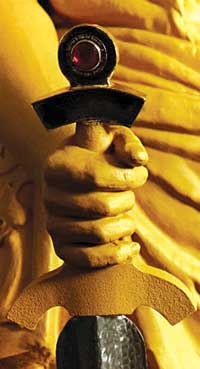 In the absence of a functioning legislature, royal ordinances have become the only way to make or amend laws. The executive hangs by the thread of Clause 127 of a comatose constitution and is dependent upon royal mercy for survival. The fourth estate is trapped between the state and the insurgents.
In the absence of a functioning legislature, royal ordinances have become the only way to make or amend laws. The executive hangs by the thread of Clause 127 of a comatose constitution and is dependent upon royal mercy for survival. The fourth estate is trapped between the state and the insurgents. Civil society is sometimes called the 'Fifth Estate' but has become the playing field of vested interests. In the resulting anarchy, the courts could have been the hope of last resort. But the judiciary is itself mired in an unprecedented crisis. Prime Minister Sher Bahadur Deuba has finally succeeded in getting an insider appointed attorney general by the king, but a bigger battle looms to select competent and impartial judges for 16 courts of appeal.
The positions of more than three dozen justices will fall vacant in the coming months. The sort of people appointed will affect the image of the judiciary. Mud slinging between the bar and the bench in the past have dragged the judiciary through the streets. The resulting spectacle has damaged the people's faith in the courts. The judiciary is the guardian of the rule of law in any modern state, and we need to protect it from becoming the tool of those in power.
The courts of Nepal have been hamstrung from the beginning. After the Shah Restoration in the 1950s, courts were named nyayalaya, the Sanskrit term meaning 'house of justice'. Royal preceptors weren't happy with the term, since their interpretation of Hindu scriptures made justice the prerogative of the crown. The function of the courts under an active monarchy was to merely to pass on the orders of the divine ruler.
Preceptors prevailed over politicians, and the courts of Nepal were renamed adalat-a word of Persian origin meaning an office of the state that settled disputes. Thus, the agenda for the third estate was decided by semantics between the players of power politics.
The 1990 constitution left the institution of monarchy outside the preview of the judiciary. The supreme court remained an adalat-not a court of justice, but a court of law. (US supreme court justice Oliver Wendell Holmes Jr once reprimanded an unsatisfied litigant: "This is a court of law, young man, not a court of justice.")
For a court of law, procedure is the primary consideration and the notion of justice is secondary. It is assumed that if procedural features are closely scrutinised, the resulting decision of the court would somehow satisfy the justice criteria as well.
A court of law functions on the presumption of innocence which holds that a) everyone charged with a crime shall be considered not guilty until his or her guilt has been proven in conformity with the procedures stipulated by the law and established by the verdict of a court of law, b) the defendant shall not be obliged to prove his or her innocence, and c) the benefit of doubt shall be interpreted in favour of the defendant.
It is therefore not the function of the court to catch the culprit. It is there to ensure that the law's dragnet doesn't catch any innocents. That is why court procedures sometimes drive litigants to exasperation. One of the perils of the 24/7 television and saturation coverage in the print is trial by media. Live reporting, instant analysis, and sound-bite opinion-on-demand leave nothing to the nuances of the law. The public therefore demands the instant justice of kangaroo courts. Such certitude undermines the very concept of the court of law.
It is normal in a democracy to publicly discuss the merits of judicial decisions, but the institution of court and the character of judges should never be ridiculed. Politicians derive legitimacy from the people, and are therefore fair game. Judges need to be trusted as they have no recourse to face the public to clear their name. Smearing judges with the brush used to tarnish politicos strengthens the insurgents who question the very system of governance and are using guns to bring it down.
The unseemly controversy over the court decision about the alleged drug lord William Gordon Robinson, a British national, (see 'Nepal thrives as regional drug hub' #198) irreparably damaged the judiciary. In such cases, it's best to let the law take its own course without undue meddling from the self-declared protectors of the public interest. In addition, choosing justices of impeccable character would keep the courts beyond reproach.



